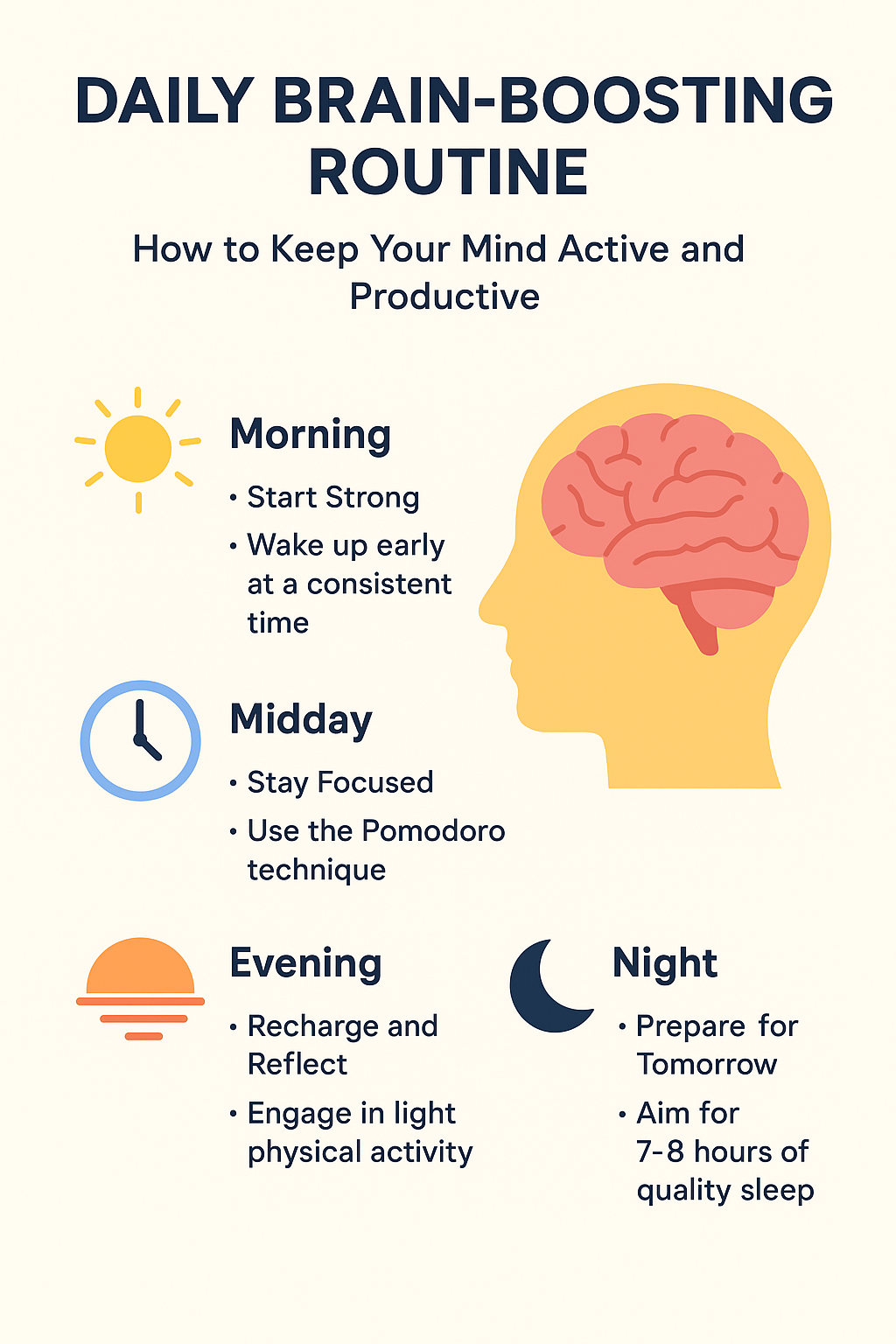Introduction
Your brain is your most powerful tool which enables you to think clearly, solve problems and make daily important decisions. So, your brain requires regular maintenance through exercise to maintain its peak performance just like your physical body does. Your brain requires proper care through exercise because neglecting it results in mental fatigue and decreased concentration abilities.
The good news? Basic daily routines exist to help you build up your brain power. Your mind will stay active and your productivity will reach its highest point through a combination of physical health practices and mental stimulation and mindfulness techniques.
“The brain is like a muscle. When it is in use, we feel very good. Understanding is joyous.” — Carl Sagan

Morning: Start Strong
The way you begin your day sets the tone for your mental performance.
- Wake up early at a consistent time to regulate your body’s natural rhythm. Studies show that early risers often report higher levels of productivity and better mental health (American Psychological Association, 2020).
- Hydrate first thing with 1–2 glasses of water to fuel your brain.
- Practice mindfulness through 5–10 minutes of meditation or deep breathing to clear mental fog.
- Exercise for 20–30 minutes with walking, jogging, or yoga to boost blood flow and oxygen supply to the brain. A study in Frontiers in Psychology (2019) found exercise increases brain-derived neurotrophic factor (BDNF), which enhances memory and learning.
- Eat a healthy breakfast such as eggs, oats, nuts, or fruit. Nutritionists at Harvard Medical School suggest that high-protein and high-fiber breakfasts improve attention span and energy levels.
- Learn something new by reading, listening to a podcast, or taking a short online course. Lifelong learning has been linked with reduced cognitive decline (Alzheimer’s Association, 2021).
Midday: Stay Focused
This is the time to get serious about productivity.
- Use the Pomodoro technique (25–50 minutes of focused work followed by 5–10 minutes of rest). Research in Applied Cognitive Psychology shows short breaks can improve concentration.
- Tackle the hardest tasks first while your brain is still sharp.
- Take a short walk after lunch to prevent the afternoon slump. Movement increases oxygen flow to the brain, sharpening focus (CDC, 2020).
- Eat a balanced lunch with protein, vegetables, and whole grains. Avoid heavy carbs that can trigger post-meal fatigue.
“Focus on being productive instead of busy.” — Tim Ferriss
Evening: Recharge and Reflect
Evenings are a chance to refresh and grow.
- Engage in light physical activity like sports or a walk to relax your mind.
- Spend time in social connection. Studies show strong social bonds are linked to longer lifespan and better cognitive health (Harvard Study of Adult Development).
- Dedicate 20–30 minutes to skill growth — such as learning a language, blogging, or a new hobby.
- Do something creative like journaling, writing, or brainstorming new ideas. Creativity boosts problem-solving and keeps the brain flexible.
Night: Prepare for Tomorrow
A restful night recharges your brain for the next day.
- Practice a digital detox by avoiding screens 30–60 minutes before bed. The blue light from devices delays melatonin release, disturbing sleep cycles (Sleep Foundation, 2022).
- Write down 3 things you learned and 3 things you’re grateful for. Gratitude journaling has been proven to improve sleep quality and optimism (UC Berkeley, Greater Good Science Center).
- Plan your top 3 tasks for tomorrow so you wake up with clarity and direction.
- Aim for 7–8 hours of quality sleep. Neuroscientists emphasize that sleep consolidates memory and restores cognitive function (National Sleep Foundation).
Final Thought
Small regular habits lead to brain productivity and activity without needing major changes. Your brain develops strength through proper exercise, nourishment, rest periods and appropriate mental challenges.
These habits lead to improved focus and memory while creating a balanced and creative life that brings fulfillment. Begin with one or two habits today before you expand your complete routine system. Your brain will show appreciation through tomorrow and all subsequent days.
“The mind is not a vessel to be filled, but a fire to be kindled.” — Plutarch
References
https://www.teamgantt.com/blog/morning-routines-that-boost-your-brain-and-productivity
https://www.amenclinics.com/blog/the-5-minute-morning-routine-to-boost-your-brain
https://freedom.to/blog/boost-your-brainpower
https://elevateapp.com/blog/how-to-build-daily-habits-that-keep-mind-sharp
FAQs
How to train your brain?
Dr. Danoff advises that we can train our brains through activities such as solving puzzles and word recall games and learning new languages and music and reading different materials and painting and acquiring new hobbies.
What is 75% of your brain?
About 75% of the brain is made up of water
This means that dehydration, even as small as 2%, can have a negative effect on brain functions.


